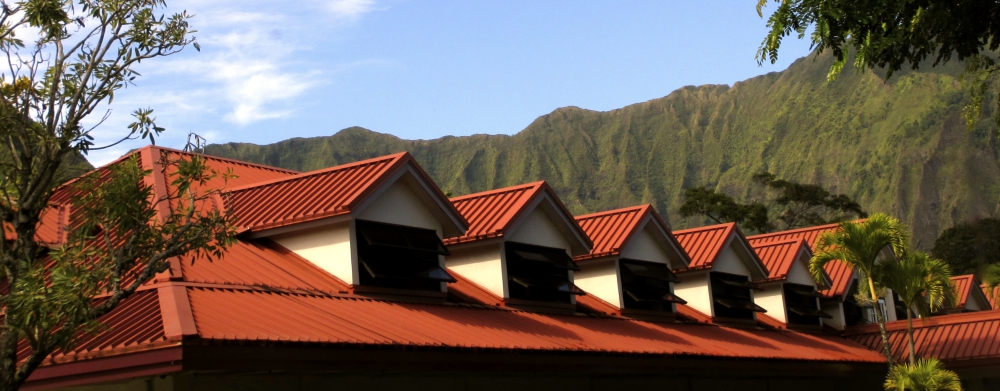Hina Mauka developed the Teen CARE (Counseling, Awareness, Rehabilitation, and Education) program to meet the needs of the youth and their families. Hina Mauka has provided substance abuse services to adolescents through the Teen CARE program for thirty years.
Hina Mauka
 Hina Mauka began in the late 1960’s as a group of dedicated volunteers at the Hawaii State Hospital who were committed to helping individuals struggling with alcoholism. In 1976 Hina Mauka was incorporated as a not-for-profit substance abuse treatment agency known as as The Alcoholic Rehabilitation Services of Hawaii Inc. Over the course of years, Hina Mauka has evolved in the delivery of services according to what is successful, while continually modifying our approach to be ever more effective in order to meet the needs of the community. Hina Mauka has been accredited by CARF (Commission on Accreditation of Rehabilitation Facilities) since 1999, an important measure of quality within the field of behavioral health.
Hina Mauka began in the late 1960’s as a group of dedicated volunteers at the Hawaii State Hospital who were committed to helping individuals struggling with alcoholism. In 1976 Hina Mauka was incorporated as a not-for-profit substance abuse treatment agency known as as The Alcoholic Rehabilitation Services of Hawaii Inc. Over the course of years, Hina Mauka has evolved in the delivery of services according to what is successful, while continually modifying our approach to be ever more effective in order to meet the needs of the community. Hina Mauka has been accredited by CARF (Commission on Accreditation of Rehabilitation Facilities) since 1999, an important measure of quality within the field of behavioral health.
Adult programs
In 1995 Hina Mauka opened adult residential substance use disorder treatment at its current Kaneohe location, providing a full continuum of substance use disorder treatment for adults, including those with co-occurring disorders. Hina Mauka opened an adult outpatient clinic at Waipahu in 1997. In 2000, Hina Mauka developed a unique therapeutic community program based on traditional Hawaiian culture and values at the Women’s Community Correctional Center (WCCC) called Ke Alaula. Today’s adult programs at Hina Mauka include substance use disorder treatment, mental health and psychiatric services, intensive case management, medical detoxification, and peer mentoring.
Teen CARE
Within the overall agency of Hina Mauka, Teen CARE focuses on services for children and adolescents. In 1987 Hina Mauka developed Hawaii’s first school-based substance use disorder treatment program at Castle High School and it proved successful in helping adolescents. Working in the school environment allows counselors to learn more about the students who are served from the school staff as well as gaining an understanding of how they interact with their friends and peers. The program expanded to middle and high schools throughout Oahu and Kauai, as well as community-based sites in Kaneohe and Waipahu. Teen CARE uses approaches that have been proven effective with adolescents, including cognitive behavioral therapy, motivational interviewing, and trauma informed care. Teen CARE’s substance abuse treatment services are funded by the Alcohol and Drug Abuse Division (ADAD) and Judiciary.
In 2005, Teen CARE began offering substance abuse prevention services on Kauai through a Hawaii Community Foundation grant. In 2010, prevention programs were developed on both Oahu and Kauai. Teen CARE collaborates with the schools and community organizations to provide evidence-based prevention education. Our social media campaigns inspire and educate teens (Substance) and their families (Teen CARE Ohana). Through community coalitions, community events, and speaking presentations, we seek to strengthen the communities we serve. Teen CARE’s substance abuse prevention services are currently funded by the Alcohol and Drug Abuse Division through the Federal Substance Abuse Prevention and Treatment (“SAPT”) Block Grant funds.
Teen CARE began working with the Child and Adolescent Mental Health Division in 2018 to provide Intensive In-Home services. We receive referrals for Intensive In-Home Services from the Leeward, Central, and Honolulu Family Guidance Centers. Services are delivered in school, home, and community settings, utilizing evidence-based approaches for youth with behavioral and mental health challenges.
Hina Mauka is committed to evidence-based practices and quality improvement, maintaining CARF accreditation since 1999. Service is the foundation of Hina Mauka, informing our values and the spirit of our work
Teen CARE Timeline
- 1987 Castle High School pilots the first school-based substance treatment program
- 1989 Olomana Youth Center requests school-based treatment services
- 1991 Teen CARE expands to Pearl City HS, Kalani HS, and Kalaheo HS
- 1997 Teen CARE establishes programs at Mililani HS
- 1998 On Kauai, Teen CARE begins providing services at Kapa`a HS, Kapa`a MS, Waimea HS.
- 2000 King Intermediate requests school-based treatment services
- 2003 Teen CARE opens a program at Radford High School
- 2005 Due to the Hawaii State Legislature’s efforts to ensure treatment is available in every middle and high school, Teen CARE expands to Waimea Canyon MS, Kauai HS, Chiefess Kamakahelei MS, and Highlands IS.
- 2005 Teen CARE creates prevention programming for its Kauai schools through a grant from the Hawaii Community Foundation.
- 2006 Teen CARE establishes a treatment program at Aliamanu Middle School
- 2009 Teen CARE begins providing treatment services at Kailua HS and Kailua IS
- 2010 Teen CARE opens a community-based adolescent treatment program at our Kaneohe office
- 2011 Teen CARE establishes substance abuse prevention services on Oahu and Kauai, funded by the counties through SAMSHA’s State Incentive Grant
- 2011 Our community-based treatment program for adolescents is expanded to Waipahu and Kaneohe
- 2012 Teen CARE begins providing state-funded prevention services on Oahu and Kauai
- 2014 Teen CARE opens a community-based substance abuse treatment program in Waianae in collaboration with the Boys and Girls Club of Waianae.
- 2015 The Judiciary program contracts with Teen CARE to provide adolescent treatment services.
- 2018 Teen CARE receives funding from the Child and Adolescent Mental Health Division (CAMHD) to provide Intensive In-Home Services to youth and their families.
Teen CARE’s current prevention and treatment programs are funded through the Alcohol and Drug Abuse Division (ADAD) of the Hawaii Department of Health. The Hawaii State Judiciary funds adolescent treatment services as well. Child and Adolescent Mental Health Division (CAMHD) funds our Intensive In-Home Program.


